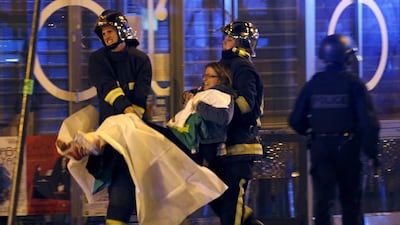At least 128 people have been killed in a series of coordinated terror attacks in Paris carried out by ISIL extremists. Francois Hollande, the French president, has called the attacks an “act of war”.
An event of this magnitude undoubtedly took months of planning. This is a far cry from the “lone-wolf” attacks in the West previously attributed to ISIL. The extremist group is thus firmly in the global mass murder business. It is striking not only at regional “enemies” such as Saudi Arabia or Hizbollah-related targets in Lebanon, but now also at the West.
ISIL would have preferred to defer this. Unlike Al Qaeda and other “salafist-jihadist” fanatics, ISIL prioritised seizing and controlling territory, and building its organisational capacity, “state” and “caliphate”.
ISIL rejected Osama bin Laden’s analysis that the “jihadist” movement ought to focus on striking western targets in order to drive the US and European powers out of the Middle East. According to bin Laden, the “far enemy” (the West) needed to be defeated before the “near enemy” (mainstream Arab and Muslim societies and governments) could be conquered.
The war in Afghanistan created an entirely new definition, and one that ironically owed much to Cold War American tutelage, of "jihad" as an individual commitment, and a global anti-colonial uprising (in that case against the "godless" Soviet communists). Indeed, bin Laden and the other "Arab Afghans", the nucleus of what would later emerge as Al Qaeda, actually believed that they and the local mujahideen had not only chased the Russians out of Afghanistan, but that they had struck the fatal blow that ended up destroying the Soviet Union itself.
During the early and mid-1990s, the “Arab Afghan” veterans of Afghanistan mostly returned to their home countries with the intention of overthrowing local governments. The most far-reaching and ambitious of these campaigns was in Algeria, as that country was plunged into a savage civil war. But the Islamists were eventually crushed and discredited.
In this context, in 1996, bin Laden, soon joined by his Egyptian sidekick Aymen Al Zawahiri, mobilised Al Qaeda with the specific purpose of reorientating salafist-jihadist priorities and emphasising the need to attack western targets in order to drive the US and Europe out of the Middle East, much as Russia had been driven out of Afghanistan.
This logic culminated in the terrorist attacks in the US on September 11, 2001. But not only did the 9/11 atrocities bring down the full weight of American and international retaliation, the organisation's credibility and popular appeal among Arabs and Muslims was also dealt a severe blow. By the time of the American invasion of Iraq in 2003, Al Qaeda was virtually moribund.
But Iraq provided the movement with a new cause and battleground. The local franchise in Iraq, Al Qaeda in Mesopotamia, fell under the sway of a particularly bloodthirsty criminal, Abu Musab Zarqawi. His approach emphasised even more intensive sectarianism, especially against Shiites, and spectacles of cruelty, such as beheading videos.
Al Zawahiri famously sent a letter to Zarqawi urging him to stop attacking Shiite mosques and making beheading videos in the name of Al Qaeda. It was completely ignored.
Zarqawi was killed, but not before he laid the groundwork for the emergence of ISIL, with its penchant for spectacular cruelty, its deep ties to former Baathist military and intelligence officials, and its commitment to establishing a “caliphate” rather than attacking the West.
The brutality of the Assad regime in Syria, and the sectarian chauvinism of the Maliki regime in Iraq, combined to create a perfect opportunity for ISIL to claim to have established precisely such a phony “caliphate”.
In the process ISIL broke with Al Qaeda over a range of issues, perhaps most importantly the question of priorities. Al Qaeda argues ISIL foolishly jumped the gun in declaring a “caliphate”, while ISIL maintains that seizing and controlling territory is the most important task.
The attacks in Paris ominously suggest that this argument may now be moot.
Perhaps ISIL has been forced into engaging mass-casualty terrorism attacks in the West long before it had planned to. But given the scale and sophistication of the Paris atrocities, hasn't ISIL adopted Al Qaeda's approach?
Only Al Qaeda in the Arabian Peninsula – the organisation's Yemeni franchise – currently appears capable of launching major international terrorist attacks. But Al Qaeda must view the Paris attacks with approval and even envy.
So, what’s most alarming is not merely the likelihood of more terrorist attacks in major Arab and western cities. It’s the possibility that ISIL and Al Qaeda, for so long divided by both ideas and personalities, might now be able to form a working alliance or even reunify. The rift that began with Zarqawi might soon prove practically irrelevant at the level of strategy and tactics.
If the only thing keeping ISIL and Al Qaeda apart now is personal and organisational rivalry, rather than any substantive disagreement, then surely the potential for reunification and the emergence of a larger, stronger and more coordinated terrorist menace, is the most alarming prospect of all.
Hussein Ibish is a senior resident scholar at the Arab Gulf States Institute in Washington
On Twitter: @ibishblog


